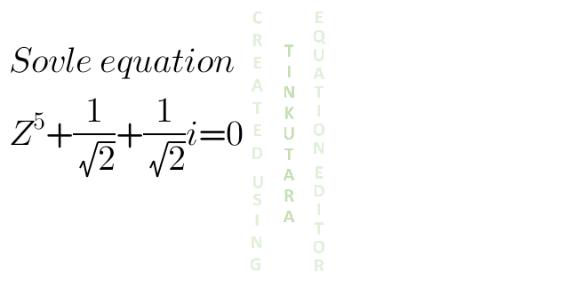
Question and Answers Forum
Question Number 131309 by shaker last updated on 03/Feb/21

Answered by Ar Brandon last updated on 03/Feb/21
![z^5 +(1/( (√2)))+(1/( (√2)))i=0 ⇒z^5 +e^((π/4)i) =0 z^5 =−e^((π/4)i) =e^((π/4)i+(2k+1)πi) =e^(((8k+5)/4)πi) z=e^(((8k+5)/(20))πi) , k∈[0, 4]](Q131314.png)
Answered by mathmax by abdo last updated on 03/Feb/21
![z^5 +(1/( (√2)))+(i/( (√2)))=0 ⇒z^5 =−e^((iπ)/4) =e^(iπ) .e^((iπ)/4) =e^(i(π+(π/4)) ) =e^(i((5π)/4)) =e^(i(((5π)/4)+2kπ)) ⇒ the roots are z_k =e^((i(((5π)/4)+2kπ))/(5 )) =e^(((iπ)/4) +i((2kπ)/5)) with k∈[[0,4]]](Q131352.png)
| ||
Question and Answers Forum | ||
Question Number 131309 by shaker last updated on 03/Feb/21 | ||
 | ||
Answered by Ar Brandon last updated on 03/Feb/21 | ||
![z^5 +(1/( (√2)))+(1/( (√2)))i=0 ⇒z^5 +e^((π/4)i) =0 z^5 =−e^((π/4)i) =e^((π/4)i+(2k+1)πi) =e^(((8k+5)/4)πi) z=e^(((8k+5)/(20))πi) , k∈[0, 4]](Q131314.png) | ||
| ||
Answered by mathmax by abdo last updated on 03/Feb/21 | ||
![z^5 +(1/( (√2)))+(i/( (√2)))=0 ⇒z^5 =−e^((iπ)/4) =e^(iπ) .e^((iπ)/4) =e^(i(π+(π/4)) ) =e^(i((5π)/4)) =e^(i(((5π)/4)+2kπ)) ⇒ the roots are z_k =e^((i(((5π)/4)+2kπ))/(5 )) =e^(((iπ)/4) +i((2kπ)/5)) with k∈[[0,4]]](Q131352.png) | ||
| ||